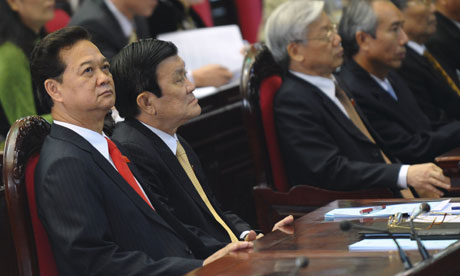
From left: Vietnamese prime minister Nguyen Tan Dung, president Truong Tan Sang, and general secretary of the Communist party Nguyen Phu Trong. Photograph: Hoang Dinh Nam/AFP/Getty Images
The Vietnamese authorities are tight-lipped when it comes to requests for comment on the fate of political dissidents, who are facing a growing crackdown on their activities.
 When asked by email about the cases involving Nguyen Ngoc Quang and Nguyen Thu Tram, who have beenforced to flee the country after being interviewed by the Guardian, the foreign ministry was giving little away.
When asked by email about the cases involving Nguyen Ngoc Quang and Nguyen Thu Tram, who have beenforced to flee the country after being interviewed by the Guardian, the foreign ministry was giving little away. “No individual is arrested, detained or imprisoned for their religion, belief and expression of their political views in Vietnam. Only those who violate the law are handled in accordance with the law,” said Luong Thanh Nghi, a spokesman.
Yet events in Vietnam suggest otherwise. Since the Communist party congress in January, the authorities have steadily ratcheted up the pressure on dissidents.
“No individual is arrested, detained or imprisoned for their religion, belief and expression of their political views in Vietnam. Only those who violate the law are handled in accordance with the law,” said Luong Thanh Nghi, a spokesman.
Yet events in Vietnam suggest otherwise. Since the Communist party congress in January, the authorities have steadily ratcheted up the pressure on dissidents.
 Fifteen religious activists have been imprisoned since 30 July. Dr Cu Huy Ha Vu, a popular and respected lawyer with deep family connections to the Communist party, was sentenced to seven years’ imprisonment in April, to the shock and outrage of large sections of the Vietnamese public.
Fifteen religious activists have been imprisoned since 30 July. Dr Cu Huy Ha Vu, a popular and respected lawyer with deep family connections to the Communist party, was sentenced to seven years’ imprisonment in April, to the shock and outrage of large sections of the Vietnamese public. The broader rights situation is not much better: in September, Human Rights Watch released a report detailing a vast system of forced labour and torture in the country’s drug rehabilitation centres.
The situation is unlikely to change any time soon.
New prime minister Nguyen Tan Dung, who was selected for the post at the party congress in January, is decidedly not a reformer, said Carlyle Thayer, a Vietnam expert at the Australian Defence Force Academy.

The party is dominated by conservative factions, and “it is not in the interest of any faction to go soft on dissent”, Thayer said. Worries about the Arab spring and a possible Chinese “jasmine” revolution have made an already deeply paranoid leadership even more so.
As the human rights situation in Vietnam worsens, India and the United States are courting closer ties with the Vietnamese government.
For differing strategic reasons, both countries have increased military co-operation with Vietnam and publicly backed it in territorial disputes with China in the resource-rich South China Sea.
But neither of these countries – the two largest democracies in the world – has seen fit to pressure Vietnam on its rights record with any conviction or consistency.

With activists like Nguyen Thu Tram and Nguyen Ngoc Quang in exile or in prison, and foreign journalists barred from reporting on sensitive issues inside the country, the outside world will find it harder to know exactly what is happening inside Vietnam.
And it will be that much more difficult to know what lengths the Vietnamese authorities are willing to go to in order to silence the tenacious but increasingly besieged pro-democracy movement.
Reported by Dustin Roasa
Source: The Guardian
Related Information:

No comments:
Post a Comment